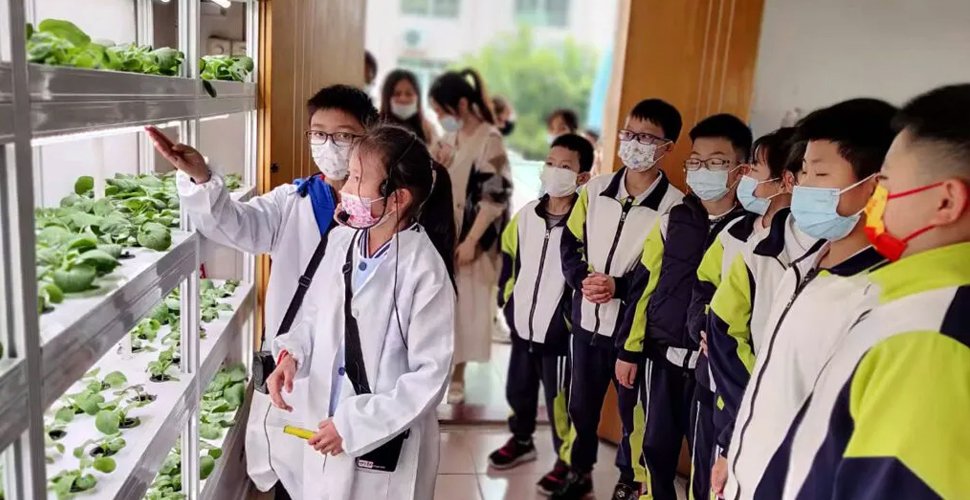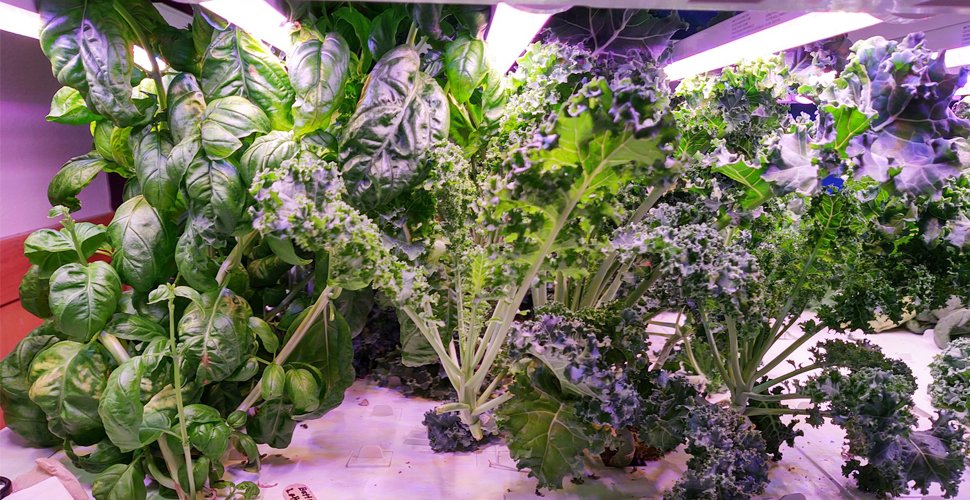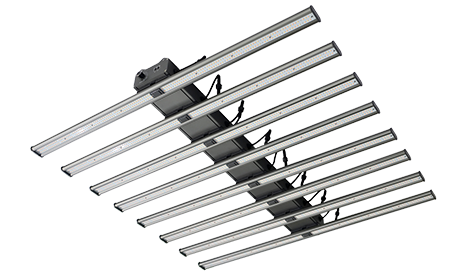Obsah
We all recognize the benefits of school gardens, which have excellent educational value for everyone involved. It can positively impact students and campuses, the physical and mental health of students, and even the entire regional education system in many ways. A the emerging classroom hydroponics system is a hot commodity on campuses and in homes, as hydroponics is changing the way the world thinks about food production.
A hydroponic vegetable garden is soilless and relies on water and nutrient solutions. This makes them ideal for schools where winter or rainy weather prevents outdoor planting. It is also suitable for schools or educational institutions that do not have a large piece of land to establish an outdoor garden.
The climate-controlled hydroponic systems make food production and education possible at any time of the year, in any weather conditions. And its efficiency and precise controllability make it an excellent tool for integration with campus education, especially in STEM (science, technology, engineering, and mathematics) education.
If you are an educational institution decision-maker or a school teacher, I think you should be interested in a hands-on plant lab educational hydroponics system that requires learning about STEM.
Come along and learn why the classroom hydroponics system is such a powerful teaching tool.
Impact of School Gardening on Learning
Teachers across the United States are engaging students in hands-on project-based education through hydroponics. Certain schools in China are also getting involved.
Why are they all doing hydroponics education programs?
On the one hand, even a wealth of theoretical knowledge gained from books is no match for the truth gained through hands-on practice. As educators, it is important to understand what students need to be invested in their learning. There is also a need to think about what new programs can be developed to engage students in learning exploration.
Hydroponics training, on the other hand, has been shown to have many positive effects on students’ physical and mental health.

Engage Students with Hands-on STEM Education Projects
The success of our economy and the future of our students depends on an understanding of STEM concepts. Employment in STEM fields continues to grow each year as the demand for specialized skills increases.
This means that fostering a love of STEM at an early age can inspire students to pursue careers in STEM fields. If your students enjoy learning STEM standards through projects, they’ll love it when you introduce a hydroponics project for students.
Hydroponics classroom provides a great platform for STEM concepts and skills ranging from science and engineering to math to language arts and social studies.
Students are also challenged to build their own hydroponic devices and optimize their hydroponics educational systems to help them develop critical thinking skills and problem-solving abilities. They will feel a unique sense of ownership and pride when growing their own plants.
The teachers told us that their students had a great time.
Click to see this video of what students in GreenourPlanet think about their hydroponics program!

Teach A Wide Range of Topics
- Hydroponics school projects can be used to teach essential concepts in STEM education. Students can learn about the chemistry of nutrient solutions, the physics of lighting and water movement, and the biology of plant growth and development.
- Hydroponic system for schools requires students to control temperature, control the pH and nutrient content of the nutrient solution, and light schedules to improve plant production. This also provides many learning opportunities for math and chemistry as well as critical thinking and teamwork.
- Classroom gardening can also be used to teach students about sustainability and the importance of reducing waste and conserving resources, motivating them to protect our favorite planet.
- Horticulture requires students to use critical thinking skills to solve problems and make decisions. They also learn science, math and language arts concepts such as measurement, plant biology and vocabulary related to plants.
The classroom hydroponics system offers a hands-on approach that can be taught on various topics. It can also be used to address engineering, ecology, business and marketing issues in addition to science, agriculture and nutrition content. Students can even work on important soft skills while co-growing.
And most importantly, incorporate more content based on the focus of your study program!
Provide Attractive Opportunities to Practice Soft Skills
For today’s process-oriented, interconnected students, interacting and using technology to collaborate and create is second nature. Hydroponics is a great way to guide students to work on the soft skills needed in any job.
In the classroom, work with students to explore and observe the entire life cycle of a plant from seed to harvesting delicious produce. They can hone communication, teamwork and critical thinking skills as they solve problems and measure success.
Collaboration, teamwork, critical thinking, and the soft skills students will use when working together to grow food are endless.
Hydroponic gardening in schools provides an interactive experience that not only engages today’s students but also allows them to connect with the curriculum and understand the relevance of each learning component on a global scale.
Grow Fruits and Veggies Year-Round
Many students’ first reaction to hearing about soilless classroom hydroponics kits, is cool!
Not only is it cool, but it also becomes the perfect solution for schools in cold winter areas. You may not be able to grow plants outside in the snow, but your hydroponic equipment will keep your indoor plants perfectly happy.
Because of the superior controllability of hydroponics, school hydroponics can be used for food production and education at any time of the year and under any weather conditions.
Compared to traditional outdoor gardens, classroom hydroponics system utilizes vertical space, allowing more plants to be grown in a smaller space. For example, a fifth-grade school’s indoor classroom garden can grow up to 208 plants – the same amount of food produced by four average garden beds.
It’s also important to note that hydroponic plants grow up to two times faster than those grown in soil. This means you can grow more plants, get more produce and sell more products at your school farmers’ market.

Create Cross-departmental Collaboration Opportunities
A huge benefit of planting in the classroom is the opportunity for cross-departmental collaboration. Agriculture teachers, science teachers, culinary teachers and food service workers can all collaborate based on concepts such as sustainable agriculture and farm-to-school programs.
By connecting courses that students may be struggling with, new ideas can be seen in action and concepts can be understood in a way that makes them more readily accepted.
Cooking instructors lead engaging cooking classes where students can find pleasure in the colors and shapes of fruit and vegetable recipes. They often come home asking for new foods they’ve tried at school! So many students have expressed a desire to have a classroom hydroponics system like this at home and drive their families to participate in it together.
Hydroponic farming school projects can be integrated into all grade levels, and you can create a seamless learning experience for students from kindergarten through fifth grade. Imagine how cool it would be for students to start their STEM education at a young age, plus build that knowledge each year.
Benefits of School Gardening for Students
Learning gardens have been shown to have many positive effects on students’ bodies and minds. Did you know? When you harvest fruits and vegetables with them, you will be the teacher they will always remember.
- Improve Physical Health. Students are involved in setting up equipment, soaking seeds, planting, and harvesting, which helps develop their motor skills and coordination. Some schools set up hydroponics outdoor gardens, which also encourage them to spend more time outside in the fresh air.
- Raise Environmental Awareness. Classroom planting allows them to learn about the natural world. Observe the growth and life cycle of plants and animals to gain a deeper understanding and appreciation of the world around them.
- Enhance Mental Health. Research shows that spending time in nature can reduce stress and anxiety levels, and improve overall mental health. Gardening provides a sense of accomplishment and purpose and can improve self-esteem and confidence.
- Improved Nutrition. The Learning Garden provides students with the opportunity to learn about and try new fruits and vegetables. This can help them develop healthy eating habits and make more informed food choices.
- Improve Learning Skills. Indoor organic gardening requires students to use critical thinking skills to solve problems and make decisions. They also learn science, math and language arts concepts such as measurement, plant biology and vocabulary related to plants.
Is Classroom Hydroponics System Scalable?
Students need hydroponics, and hydroponics benefits students.
We believe that the hydroponics project for students can be a sustainable and replicable program with the right tools, support and dedicated educators.
While it is said that indoor classroom garden ideas are not mandatory in schools, there is still a long way to go. Hopefully, educators who dare to be innovative and have a long-term vision can move in the right direction to promote education and the magical connection with nature.
We continue to seek more interested partners to work with us so that more students can learn about STEM and urban agriculture through the classroom hydroponics system. Get in touch with us here.
Jayes
Jako digitální marketingový manažer ve společnosti AUXGROW spojuje Jayes vášeň pro hydroponické systémy a odborné znalosti v oblasti LED pěstebních světel. Díky praktickým zkušenostem a hlubokému porozumění vás Jayes provede světem udržitelného pěstování.






